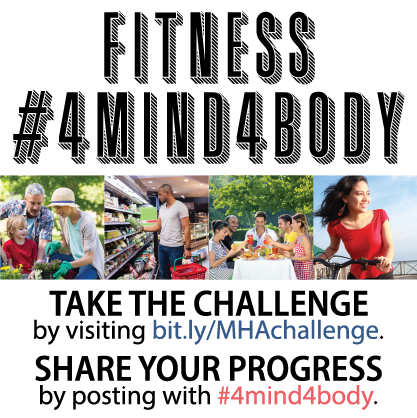Fitness 4Mind4Body: Diet and Nutrition

The quality of the food you eat can impact your overall physical and mental health. Eating nutritious foods can go a long way toward achieving a healthy lifestyle, so make every bite count.
Two Major Issues
Poor DietUnhealthy diets lead to major health problems like diabetes, heart disease, obesity, and cancer. Because of this, poor diet is the main cause of early death in developed countries. Nearly 20% of all deaths worldwide can be linked to unhealthy eating habits.1 |
 |
Mental IllnessAt the same time, mental illnesses are the biggest cause of disability and illness in the world. Depression alone is one of the top five leading causes of disability across the planet.2 |
Better Diet, Better Mental Health
A healthy diet includes a full range of vegetables, fruits, legumes (lentils, chickpeas, beans), fish, whole grains (rice, quinoa, oats, breads, etc.), nuts, avocados and olive oil to support a healthy brain. Sweet and fatty foods should be special treats, not the staples of your diet.

 |
People who eat a diet high in whole foods such as fruits, vegetables, nuts, whole grains, legumes, fish and unsaturated fats (like olive oil) are up to 35% less likely to develop depression than people who eat less of these foods.3,4 |  |
Highly processed, fried and sugary foods have little nutritional value and should be avoided. Research shows that a diet that regularly includes these kinds of foods can increase the risk of developing depression by as much as 60%.5,6 |
Children and Adolescents
| Good nutrition starts in the womb. The children of women who eat diets high in processed, fried and sugary foods during pregnancy have more emotional problems in childhood. Similarly, diets low in whole, nutrient-dense foods and diets higher in junk and processed foods during the first years of life are linked to more emotional problems in children.7,8 |  |
 |
Studies have found that young people with the healthiest diets are about half as likely to have depression compared to those with the diet highest in junk and processed foods who are 80% more likely to have depression.9,10 |
Food Can Change Your Brain
| Diet is linked to the hippocampus, a key area of the brain involved in learning, memory, and mental health. People with healthy diets have more hippocampal volume than those with unhealthy diets.11 |  |
Eating more fruits and vegetables, whole grains, legumes, fish, olive oil, and other healthy foods while eating less unhealthy junk and processed foods can be an effective treatment strategy for depression.
 |
One study found that 1/3 of participants with depression experienced full relief of their symptoms after improving their diet. The more people improved their diets, the more their depression improved.12,13 |
A Healthy Diet Doesn’t Have to be Expensive
| A healthy diet can actually be cheaper than junk and processed food.14,15 Save money by choosing canned or frozen vegetables and fish, and dried fruits and beans. These are nutritionally similar to fresh foods, stay good longer, and are usually less expensive! |  |
Nutrients to Keep in Mind
 |
 |
 |
|
Omega 3 fatty acids are essential to brain health and reduce inflammation and risk of heart disease.
Oily fish like salmon, trout, mackerel, anchovies and sardines are the most highly recommended sources of Omega 3 fatty acids, and the American Heart Association suggests eating these types of fish at least twice a week. Omega 3s can also be found in albacore tuna, walnuts, flax seeds, chia seeds, and dark green leafy vegetables like brussels sprouts, kale and spinach.
People who eat diets rich with Omega 3 fatty acids have up to 30% reduced risk of depression.16
Fish oil supplements that are high in the EPA type of Omega 3 fatty acids can help mental health. Studies show they can benefit some people with depression as much as anti-depressants.17 |
B-group vitamins help to regulate neurotransmitters, immune function, and amino acids – the building blocks of proteins in the body.
Folate and folic acid are part of the B family of vitamins and can be found in green leafy vegetables, legumes, and whole grains.
People who eat foods rich in folate have a lower risk of depression.18
Fish (salmon, trout, tuna), beef, lamb, clams, poultry (chicken and turkey), eggs, and milk are natural sources of vitamin B12. Breakfast cereals with vitamin B12 added are a good option for vegetarians.
People with a lack of vitamin B12 may be at increased risk for depression, especially if they are older.19 |
Vitamin D is important for optimal brain functioning, including mood and critical thinking.
Fatty fish like salmon and tuna have the most naturally occurring vitamin D. Some vitamin D can also be found in eggs, other dairy foods, and fortified beverages and breakfast cereals. Cod liver oil supplements are high in vitamins A and D and have some omega 3 fatty acids as well.
Sunlight is a major source of vitamin D. Five to thirty minutes of sun exposure twice a week generally produces enough vitamin D in the body. Lighter-skinned people require less time in the sun than those with darker skin.
Low levels of vitamin D are linked to depression,20 particularly seasonal depression which happens with reduced sunlight during winter. |
Join Mental Health America this May as we challenge ourselves to make small changes – both physically and mentally – to create huge gains for our overall health and wellbeing.

If you are taking steps to live a healthy lifestyle but still feel like you are struggling with your mental health, visit www.mhascreening.org to check your symptoms. It’s free, confidential, and anonymous. Once you have your results, we'll give you information and help you find tools and resources to feel better.
Sources
1Global Burden of Disease 2016 Risk Factor Collaborators. Global, regional, and national comparative risk assessment of 84 behavioural, environmental and occupational, and metabolic risks or clusters of risks, 1990-2016: a systematic analysis for the Global Burden of Disease Study 2016 (2017). Lancet. 390(10100):1345-422.
2Global Burden of Disease 2016 Disease and Injury Incidence and Prevalence Collaborators Global, regional, and national incidence, prevalence, and years lived with disability for 328 diseases and injuries for 195 countries, 1990-2016: a systematic analysis for the Global Burden of Disease Study 2016 (2017). Lancet. 390(10100):1211-59.
3Jacka FN, et al. Association of Western and traditional diets with depression and anxiety in women. (2010). The American Journal of Psychiatry. 167:305-311.
4Sánchez-Villegas A, Delgado-Rodríguez M, Alonso A, et al. Association of the Mediterranean dietary pattern with the incidence of depression: the Seguimiento Universidad de Navarra/University of Navarra follow-up (SUN) cohort. (2009). Archives of General Psychiatry.66:1090-1098.
5Akbaraly TN, Brunner EJ, Ferrie JE, Marmot MG, Kivimaki M, Singh-Manoux A. Dietary pattern and depressive symptoms in middle age. (2009). British Journal of Psychiatry. 195:408-413.
6Li, Y., et al. Dietary patterns and depression risk: A meta-analysis. (2017). Psychiatry Research. 253: 373-382.
7Jacka FN, et al. Maternal and early postnatal nutrition and mental health of offspring by age 5 years: a prospective cohort study. (2013). Journal of the American Academy of Child and Adolescent Psychiatry. 52:1038–1047.
8Pina-Camacho L, et al. Maternal depression symptoms, unhealthy diet and child emotional-behavioural dysregulation. (2015). Psychological Medicine. 45(9):1851-60.
9Jacka FN, et al. A prospective study of diet quality and mental health in adolescents. (2011). PLOS One. 6(9):e24805.
10Jacka FN, et al. Associations between diet quality and depressed mood in adolescents: results from the Australian Healthy Neighbourhoods Study. (2010). Australian & New Zealand Journal of Psychiatry. 44(5):435-42.
11Jacka FN, et al. Western diet is associated with a smaller hippocampus: a longitudinal investigation. (2015). BMC Med. 13:215.
12Jacka, FN, et al. A randomised controlled trial of dietary improvement for adults with major depression (the ‘SMILES’ trial). (2017). BMC Medicine. 15(1): 23.
13Parletta, N, et al. A Mediterranean-style dietary intervention supplemented with fish oil improves diet quality and mental health in people with depression: A randomized controlled trial (HELFIMED)." (2017). Nutritional Neuroscience. Dec 7;1-14.
14Opie RS, et al. Assessing Healthy Diet Affordability in a Cohort with Major Depressive Disorder. (2015). Journal of Public Health and Epidemiology. 7(5):159-69.
15Opie RS, et al. A modified Mediterranean dietary intervention for adults with major depression: Dietary protocol and feasibility data from the SMILES trial. (2017). Nutritional Neuroscience. Apr 19:1-15.
16Grosso G, et al. Dietary n-3 PUFA, fish consumption and depression: A systematic review and meta-analysis of observational studies. (2016). Journal of Affective Disorders. 205:269-81.
17Mocking RJ, et al. Meta-analysis and meta-regression of omega-3 polyunsaturated fatty acid supplementation for major depressive disorder. (2016). Translational Psychiatry. 6:e756.
18Tolmunen T, et al. Dietary folate and the risk of depression in Finnish middle-aged men. A prospective follow-up study. (2004). Psychotherapy and Psychosomatics. 73:334-9.
19Ng TP, Feng L, Niti M, Kua EH, Yap KB. Folate, vitamin B12, homocysteine, and depressive symptoms in a population sample of older Chinese adults. (2009). Journal of the American Geriatrics Society. 57:871-876.
20Anglin R, Samaan Z, et al. Vitamin D deficiency and depression in adults: systematic review and meta-analysis. (2016). British Journal of Psychiatry. 202:100-107.
Special thanks to Dr. Felice Jacka and the staff at the Food and Mood Centre.

